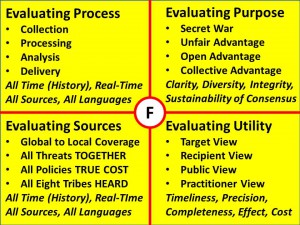
DOD INSPECTOR GENERAL HAS UNRESTRICTED ACCESS TO CLASSIFIED INFO
A Department of Defense instruction issued on Friday reinforces the policy that the DoD Office of Inspector General (OIG) is to have full access to all records, including classified records, that it needs to perform its function, and that no DoD official other than the Secretary himself may block such access.
“The OIG must have expeditious and unrestricted access to all records…, regardless of classification, medium (e.g. paper, electronic) or format (e.g., digitized images, data) and information available to or within any DoD Component, and be able to obtain copies of all records and information as required for its official use once appropriate security clearances and access are substantiated for the OIG DoD personnel involved,” the instruction states. See “Office of the Inspector General of the Department of Defense Access to Records and Information,” DoD Instruction 7050.03, March 22, 2013.
By stressing that the Inspector General's access is independent of a record's classification, medium or format, this language elaborates and bolsters the text of a previous version of the instruction, which did not make those distinctions.
Furthermore, the new instruction specifies, “No officer, employee, contractor, or Service member of any DoD Component may deny the OIG DoD access to records.” Only the Secretary of Defense may invoke a statutory exemption to limit IG access to certain intelligence, counterintelligence, or other sensitive matters, which he must then justify in a report to Congress.
As a result these robust access provisions, the DoD Inspector General is well-positioned to conduct internal oversight not only of the Pentagon's extensive classified programs, but also of the classification system itself, particularly since the Department of Defense is the most prolific classifier in the U.S. government.
In fact, the Inspector General of each executive branch agency that classifies national security information is now required by the Reducing Over-Classification Act of 2010 to evaluate the agency's classification program. Each Inspector General was directed “to identify policies, procedures, rules, regulations, or management practices that may be contributing to persistent misclassification of material.”
The first evaluation is due to be completed by September 30, 2013. Vexingly, the Act did not provide a functional definition of “over-classification” or “misclassification.” Therefore, the first hurdle that the IG evaluations must overcome is to determine the nature and the parameters of the problem of over-classification.

Phi Beta Iota: This is a good baby step. It does not address return on investment, deep secrecy, black ops, or the dual chain of command that operates completely outside the authorities and cognizance of the Secretary of Defense and the President of the United States — and of course also completely by-pass the Congress and the Office of Management and Budget. We are still waiting to hear who is selected to be the Assistant Inspector General for Intelligence (Robert Steele is one candidate found eligible and referred). The average person — however well intentioned — will do nothing in this job except churn out reports that are superficial and change nothing. Put in the simplest possible terms, DoD is chock full of two types of traitor: those that serve external masters for ideological reasons, and those that serve external masters for financial reasons. That is a counterintelligence problem but it bears on the effectiveness of the ASD IG Intel. The IG role should be formative and educational in nature — as originally conceptualized by George Washington. Right now DoD intelligence is “out of control” and running on auto-pilot — spending money mindlessly while providing no significant value to the new SecDef as he tries to get a grip on strategy, policy, acquisition, and operations, all of them devoid of ethical evidence-based decision-support. You cannot investigate nor punish your way out of this mess, but you CAN set some standards, flush the traitors, and have counterintelligence, management, and the IG as educator work ably together. If SecDef wants to fix intelligence, which is the pre-condition for fixing strategy, policy, acquisition, and operations, then SecDef needs an ASD IG Intel that knows more than everyone else (in the holistic and ethical evidence-based sense) and is prepared to educate them in their responsibilities and then mentor them as they do a 180 degree turn back toward responsible intelligence with integrity. No one now serving is capable of doing that. As Monty said when Ike was confronted with the straight-forward decision about whether the paratroopers should be dropped close to the front or far enough back to be “safe,” let's see what SecDef decides.

See Also:
2012 Robert Steele: Reflections on Inspectors General
Worth a Look: Book Reviews on Intelligence (Most)



